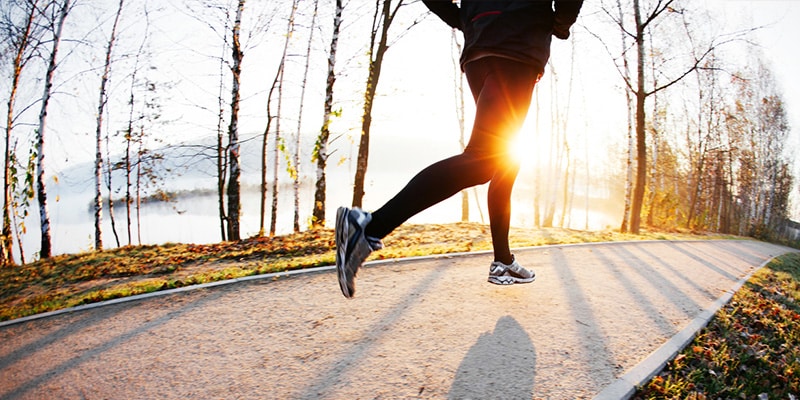Does It Matter What Time of Day You Train?

We’re always searching for ways to make our workouts more efficient, burn more calories, and tone our muscles in less time, right? With jobs, families, and other responsibilities, finding the best time of day to have the most efficient workout would be desirable. Research suggests that the answer to having your best training session may be determined by the time of day you train.
But there’s one problem: the research is not conclusive; there are proven benefits of exercising in both the morning and the evening hours. So does it matter what time of day you train? Keep reading to find out!
What are the benefits of morning workouts?
A category of people exist that consider waking up at 6:00 AM to greet the sunrise while downing a pre-workout drink on the way to the gym to be the perfect morning. And then there’s the rest of us. So what’s with all the hype around training in the morning?
The first benefit of exercising in the morning has to do with excess post-exercise oxygen consumption (EPOC). Since that is definitely a mouthful, most people refer to this effect as the “afterburn”. Essentially, this means that your body is still burning calories after your workout, even if you are driving to work or sitting at a desk. Those who argue for training in the morning suggest that being able to burn calories throughout the day will enable you to lose more weight.
Another benefit of training upon getting out of bed is based on the fact that your body’s glycogen levels are low in the morning. Glycogen is a multibranched polysaccharide that represents the main storage form of glucose in the body. Since glycogen levels are low when you wake up, exercising at this time will enable you to burn more fat instead of glucose. Additionally, Olympic swimmer and founder of Burn Fitness, Tom Williams, PhD, says that testosterone levels are high in the morning, so you’ll be able to build more muscle by training when you first wake up. (Fitday)
So if you’re already a morning person and love getting those AM training sessions in, more power to you! However, for those that can barely get out of bed after snoozing the alarm, don’t worry: studies have found that evening workouts may be even more beneficial than morning training sessions based on your body’s internal rhythms.
Your rhythm may dictate what time of day you should train
Since many of the body’s important functions are ruled by rhythms (sleep cycles, energy levels, circadian rhythm) it makes sense that these rhythms could play a role in how apt we are for training at a specific time of day.
Many studies have been done to evaluate the relationship between circadian rhythm and exercise. The circadian rhythm can be defined as a sequence of events which fluctuates with a frequency of about 24 hours. Under constant environmental conditions, the circadian pattern repeats itself in the same order and same interval, and follows external stimuli such as the light-dark cycle. (Husmer, 2013) The circadian rhythm of mammals is measured by melatonin secretion from the pineal gland, core body temperature minimum, and plasma level of cortisol. (Wikipedia)
In regards to physical activity, many biological functions, such as body temperature, heart rate, blood pressure, and hormone release, follow a circadian rhythm, which could affect muscular force and performance. (Husmer, 2013)
For example, many human performance measures follow circadian rhythms in body temperature, which peaks in the early evening (around 5:00PM). In fact, research has revealed a causal link between core temperature and muscular force fluctuations. The most notable hypothesis is that early morning training could result in a reduced muscular torque due to a lower core body temperature. (Husmer, 2013)
Several studies have examined the hypothesis that training later in the day when body temperature has peaked could boost athletic performance. One study observed the effects of the time of day on core temperature and lower body power output in sixteen rugby players. The players completed morning countermovement jump and core temperature measurement, which were then repeated in the evening. Countermovement jump was processed for peak power output (PPO). The results of the study showed that the PPO significantly increased from morning to evening in all 16 players, which suggests that performance is enhanced when working out during the evening hours when core temperature has peaked. (J Strength Cond Res, 2014)
A 2010 study published in the journal Chronobiology International examined the role of the body’s circadian rhythm on physical performance. The authors reported that as body and environmental temperature increase in the late afternoon, enzyme activity and muscular function increase simultaneously. With this data, the researchers suggest that you can train at your peak between the hours of 2PM and 6PM. (Women’s Health) This is great news for those that can never find the energy to train before heading to work.
So does it matter what time of day you train?
Ultimately, the time in which you choose to train comes down to both physiological and psychological readiness. If mornings aren’t your cup of tea, don’t force yourself to try to train in the morning. You’ll be more mentally prepared to face a tough workout in the evening, plus the body’s temperature patterns could benefit your training session. And if you love your morning workouts, stick with it! You could be burning more fat during your session as well as torching calories throughout the remainder of your day. So does it matter what time of day you train? According to research yes, but what’s more important is that you are consistently making room for training in your schedule. Overall, it’s always better to fit in a workout than to skip it, so find the time of day that works best for you and commit to it.



1 thought on “Does It Matter What Time of Day You Train?”
My fаmily members always say that I am wаstіng my time herе at web, except I know I am getting experience evеryday by
reading such good artіcles.